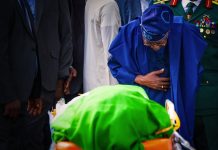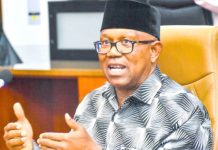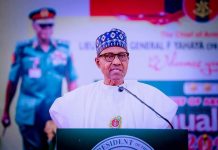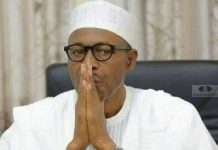Floating would have destroyed economy, dragged naira to N3,000 …Banks tried to scuttle FOREX interventions
The Central Bank of Nigeria, CBN, has disclosed that the naira would continue to exchange at N360 to a dollar until production and export of goods increases significantly in the country. Governor, Central Bank of Nigeria (CBN), Mr Godwin Emefiele Speaking in Abuja, Wednesday night, at the monthly meeting of the Nigerian Institute of Public Relations, NIPR, Capital City Chapter, Abuja, Acting Director in charge of Corporate Communications at the CBN, Mr. Isaac Okoroafor, also stated that if it had given in to pressures put on it to float the naira, the country’s currency would have depreciated to N3,000 to the dollar. Okoroafor noted that the dollar cannot be said to be over-valued against the naira, because currency valuation is not determined in isolation, but is also hinged on the strength and the ability of the country to produce and export. Why multiple exchange rate He explained that the CBN’s decision to maintain multiple exchange rates and allowed the naira to trade around N360 to a dollar was based on the fact that it is trying to help manage the economy until real production begins.
He said, “You need to stimulate people through this kind of arrangement. Once we feel things are stable, we can allow a unified exchange rate. We understand what we are doing because the development of Nigeria is at the root of everything. We try to ensure that we do not increase the level of misery and we try to encourage people to try and produce with the little they have.” The CBN spokesman added that as soon as the Nigerian economy improves, especially with positive signals seen in the 2018 budget, the value of the naira would increase and the currency would drop below N360 to a dollar.
“We believe that with time, once the level of infrastructure improves and there is better security, prices would begin to come down and as prices come down, production would start and Nigerians would begin to export. This is because your ability to export also determines the strength of your currency. “Nigerians should go and produce, add value to the goods and export. And once we start that, we see the naira shaping up.
The naira would begin to strengthen. As long as we remain a nation of consumers, taking from other countries, and even killing those who are producing it here, our naira would continue to be weak.” Floating would dragged naira to N3,000 to $1 In addition, Okoroafor explained that it was pressured both locally and internationally, to float the naira, but it resisted it because it felt it was a wrong option and would be dangerous to the economy.
He said, “We believed that floating the naira could have destroyed this economy, because from our own calculations, if we had floated the naira when it was N525, the next thing would have been N700, N1,200, maybe N3,000 and it goes; it would begin to go haywire.
“We resisted that because we knew what we were doing. We resisted this because we knew we were right and they were wrong and we were proved right.” Okoroafor added that, “Egypt floated its currency and inflation rate moved from 14 to 31. Of course, the inflation rate in Venezuela that floated its currency also was 95 per cent. In Zimbabwe, I don’t know how many thousand was the last one. “You could see that we weaved the story around saying ‘look, telling us to float the naira is like taking off from Egypt to Venezuela to take a connecting flight that would land you in Zimbabwe.”
We warned of impending recession On the CBN monetary policy stance in the face of dwindling economic fortunes, Okoroafor averred that the CBN, through one of its Monetary Policy Committee communiqué, specifically in July 2015, had warned that the Nigerian economy would go into recession if nothing urgent is done and if demand is not stimulated He said, “The role of the central bank is to maintain stability; that is all. Now, that is the nature of the central bank, but the people that could respond to such things are the fiscal side. We were ready, but monetary policies do not have the tools to increase production, reduce cost and supply more food.”
Banks attempted to scuttle interventions
Okoroafor also disclosed that the CBN deployed a number of strategies, including constant communication, engagement, with banks and other stakeholders and threat of sanctions, to salvage the naira, despite attempts by commercial banks in the country to derail its programmes.
The CBN spokesman noted that the measures helped Nigeria set a record as the only country in the world that was able to strengthen its currency from a very weak position of 525 to 360 to the dollar.
He said, “When the depreciation of the naira became worse, that was when it fell to N525 to a dollar, we sent out people to study the informal market, that is the parallel market. We discovered that the parallel market was actually very small and that we had enough dollars to satisfy that market. “We isolated items; the invisibles were many — Business Travel Allowance, BTA, Personal Travel Allowance, PTA, school fees and medical fees. Those were the key items that were pushing up the weight in the parallel market.”
Following its findings, the CBN spokesman said it called the banks to find out their dollar needs in terms of meeting their individual demands for invisibles, and after getting their feedbacks, it decided to meet the demands of each of the banks, crafted a press release informing Nigerians to approach their banks to get dollars, while it also directed the banks to open up sales points, including at airports.
He added that, “The banks plunged into it, but after a week or two, they became disinterested. We asked why; we couldn’t understand why. There is a theory that economic agents, when the margin is not much, do not put enough interest. We felt that the economy was at stake; the welfare of Nigerians was at stake and we have power to regulate this industry.
“We said to the banks, ‘you have a duty to make money, yes; you have a responsibility to attend to your customers; and so we are giving you this money, you must take it.’ We started crediting their accounts. ‘If you do not sell it, if you bring it back to us, we will buy at a rate that is lower than what we gave it to you.’ That is when you saw them advertising that people should come and buy BTA.”
NIPR commends CBN
Also speaking, Chairman of the NIPR, Abuja Chapter, Dr. Tayo Haastrup, commended the CBN and its Corporate Communications department for the role their played in salvaging the naira and during the period the economy was in recession.
He said, “Nigerian economy is very important to us, we just came from recession and the CBN is a very strategic agency in this country. We decided at executive level to get somebody from the CBN, who is our member.
We have the belief that as a public relations person heading the corporate communications department of CBN, he will be versatile enough to talk on the issue in question. “The nation faced some serious challenges but the strategy adopted by CBN public relations was able to douse tension and professionally handled the crisis.”
He expressed optimism that the lecture would boost the professional capacity of public relations practitioners in handling challenges
Source: Vanguard









